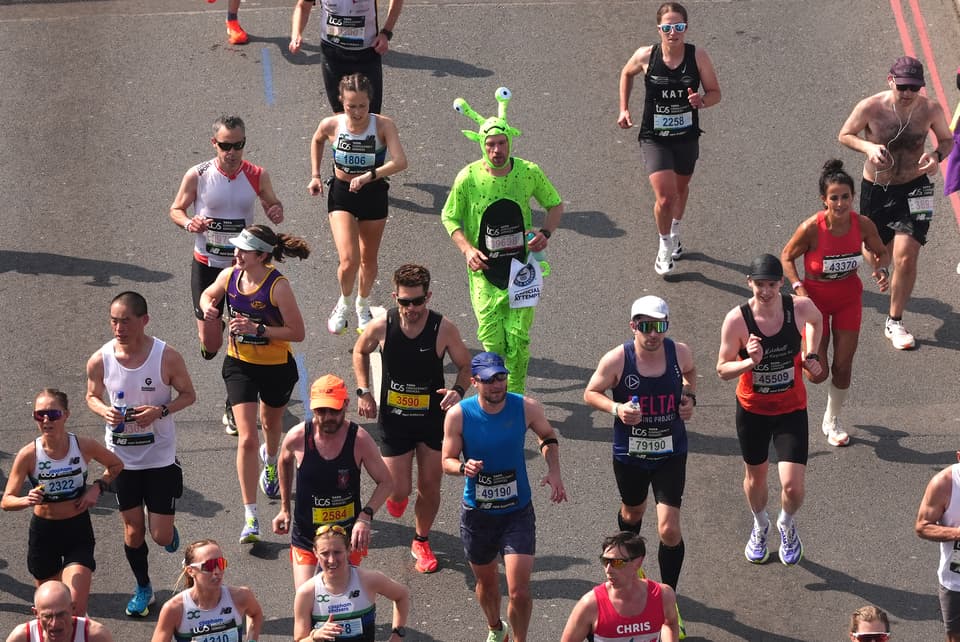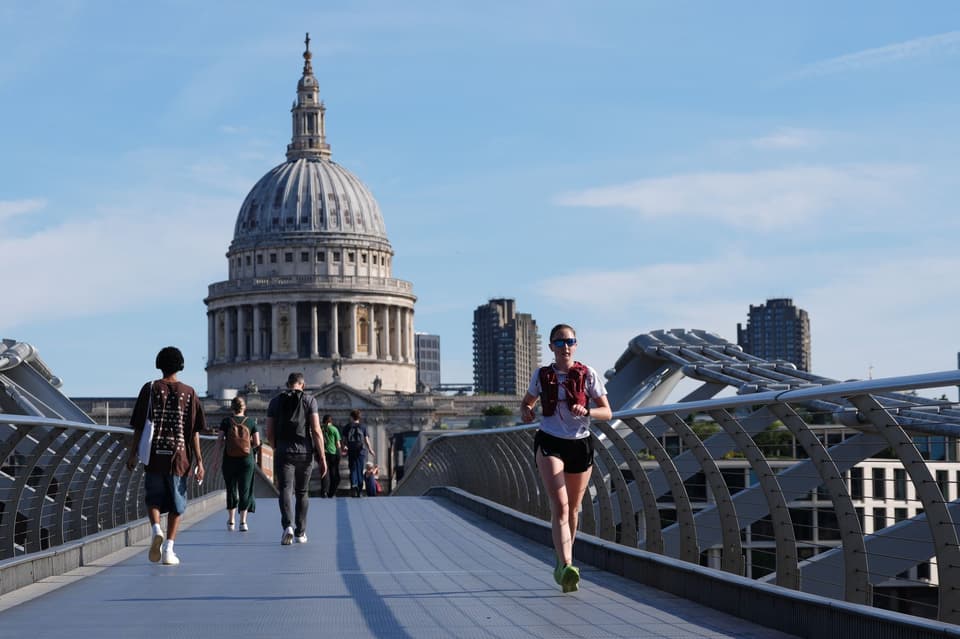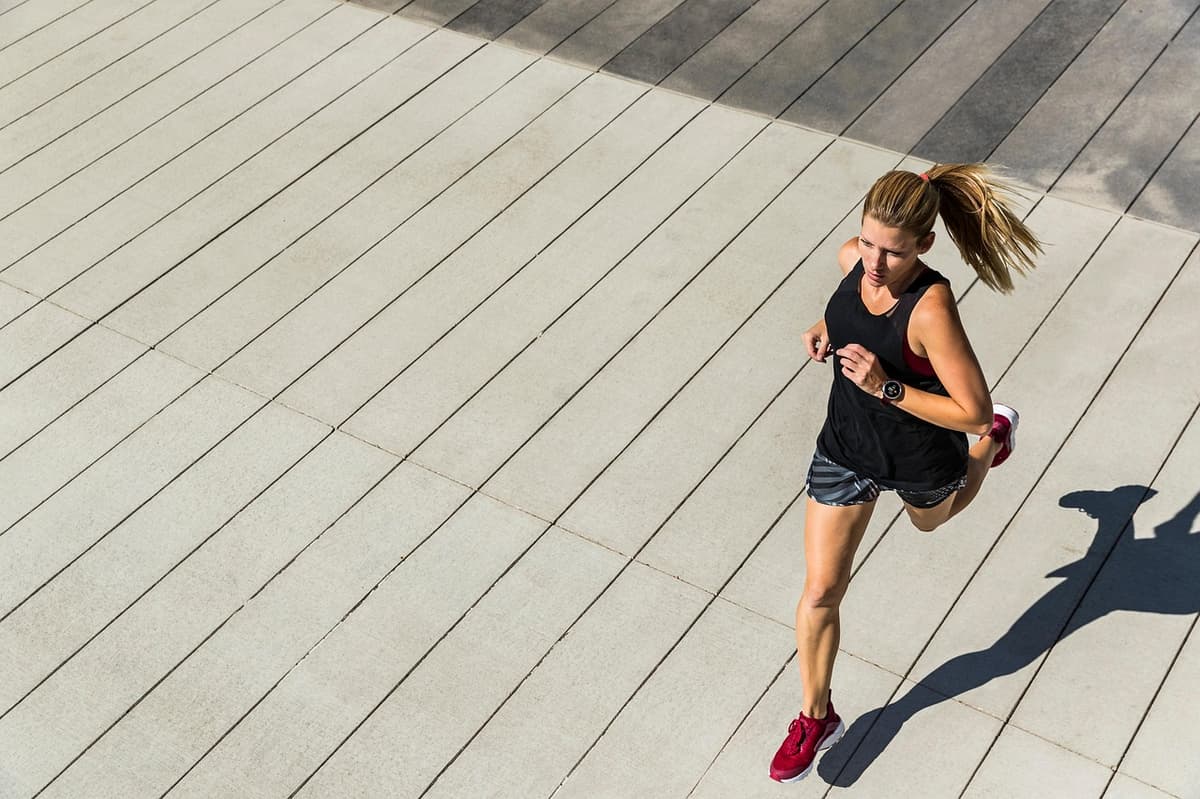
It’s August, which means the capital is officially in the thick of heatwave territory.
But that’s not stopping people from getting their exercise. Running has emerged in recent years as one of London’s biggest sports: in 2024, one in five people over 16 said they went running at least monthly, while more than 1.1m applicants have already put their names down for the 2026 London Marathon.
We’re a city of runners. However, with temperatures set to top 30 degrees this week, there’s a real danger of those same runners overheating during as they try and get their kilometres in.
Fortunately, with a bit of prep, it can be avoided. We chatted to ultra-runner and co-founder of Black Trail Runners, Sabrina Pace-Humphreys, and Tom Bishop, a seasoned runner who broke the record for the ironman triathlon last year (previously held by Alistair Brownlee), on how to beat the heat.

(Jonathan Brady/PA)
PA Wire
For Bishop, keeping cool before a run or race is key. “Starting with your core temperature as low as you can will give your body more chance to run in hot conditions, rather than starting hot and flustered,” he says.
“Try to relax, find shade and keep your warmup minimal. Of course warming up is still important, but in the heat, you don’t need to push it as much.” To lower the body temperature even further, consider sipping on an icy drink, or slushie, before you go for a run or do a race.
The most efficient way to hydrate, especially before a run, is by sipping fluids regularly during the day, rather than in one go. According to Pace-Humphreys, it’s “far more effective than panicking and overloading because you forgot. Little and often keeps your body balanced – downing huge amounts in one go won’t provide the same benefits.”
When it comes to running, it’s not about looking cool: it’s more about keeping the body temperature down. Opt for shorts, vests, crop tops, and ideally items that have a good breathability.
If you want, you can tuck some fabric into the back of your sunhat to form a protective barrier for your beck and shoulders. Don’t forget suncream, too: skincare brand Dussl has a good selection of factor 50 suncreams that also double up as moisturisers, block pollution and will stay on amid the sweat of a hot run.

A person runs across the Millennium Bridge in London
Jonathan Brady/PA Wire
One of the biggest dangers during a hot run is – you guessed it – overheating, which comes with symptoms like dizziness, sickness and a rapid heart rate. In hot weather, it’s important not to push yourself: instead, listen to your body.
“Your body will tell you what it needs but only if you have the patience to listen,” Pace-Humphreys says. “Whether it’s watching your heart rate zones creep into the red, or just sensing that things feel harder than they should, tune in. Slow down to a jog or alternate walking and running – there’s no shame in preserving energy to avoid burnout.”
It’s also important to know what to do when you are overheating. “If you feel your body temperature rising, pull it back and breathe through it,” she says. “Give box breathing a go – inhaling for 4 seconds, holding for 4 and exhaling for 4. This can help calm your mind, reduce anxiety and lower your heart rate.”
In the heat, appetite can dip – which makes staying hydrated and properly fuelled tricky, too.
“Liquid carbs can be a real help. Whether they’re shop-bought or even just half juice, half water, having a liquid option can help keep your energy up when solid food isn’t appealing,” Pace-Humphreys says.
Plus, do invest in some electrolytes, which will replace the essential minerals and salts that your body is sweating out. Don’t overdo it, though: “overdoing electrolytes can cause frequent toilet stops, nausea and diarrhoea – I’ve been there! If that happens, ease off, dilute with water, and give your body time to recalibrate.”
Make time to cool down afterwards
Once you’ve finished the run, that’s not it. Give the body time to cool down. Sit, or stretch it out, in the shade, and let the breath return to normal. And use the cooldown as a chance to get some water in you – hydrating little and often, of course.
